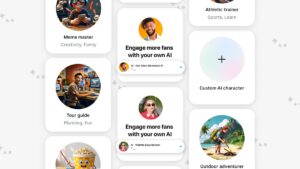Zuckerberg Indicates Meta AI Monetization Will Require Time

Meta AI Monetization: Understanding the Timeline and Challenges
Introduction to Meta AI
Meta, formerly known as Facebook, is making significant investments in artificial intelligence (AI) as part of its core strategy. As AI becomes increasingly integrated into digital platforms and services, Meta aims to leverage this technology not only to enhance user experience but also to drive revenue through monetization.
The Vision for AI at Meta
Meta’s AI initiatives focus on enhancing communication, personalization, and content creation across its platforms, which include Facebook, Instagram, and WhatsApp. By developing advanced AI systems, Meta aims to create a more engaging and interactive user experience.
Key Objectives of Meta AI
- Improving user interactions: AI is being used to better understand user preferences and behaviors.
- Enhancing content delivery: Algorithms are designed to ensure users see the most relevant content.
- Automating tasks: AI aims to streamline processes for both users and businesses, making it easier to engage with content and advertising.
Challenges in Monetizing AI
While Meta’s ambitions for AI are significant, Mark Zuckerberg has indicated that monetizing these technologies will not happen overnight. A few key challenges stand in the way of swift monetization.
1. Development Timeframe
Developing robust AI systems that deliver valuable insights and functionalities is complex and time-consuming. The technology needs to be fine-tuned to ensure accuracy and efficiency before it can be effectively monetized.
2. User Adoption
Even with advanced AI capabilities, widespread user adoption is crucial for monetization. Meta must ensure that users are comfortable with AI tools and see value in using them. Without this acceptance, monetization efforts may falter.
3. Regulatory Considerations
As AI use becomes more prevalent, regulatory scrutiny is increasing. Meta must navigate compliance with data protection laws and fairness in algorithmic decision-making, which can affect how they monetize AI.
4. Competition in AI Market
The AI landscape is highly competitive, with numerous tech giants vying for market share. For Meta, distinguishing its offerings from competitors and demonstrating clear value to users is essential for successful monetization.
Current Strategies for AI Monetization
Despite these challenges, Meta is actively exploring ways to monetize its AI initiatives. Below are some strategies the company is using to integrate AI into its revenue model.
1. Advertising Innovations
Meta is looking to integrate AI into its advertising solutions. Targeted ad placements and content recommendations driven by AI analytics can significantly improve advertisers’ return on investment.
2. Paid Subscriptions and Features
Meta may consider offering premium features or subscription services powered by AI. Features that enhance user experience, such as advanced content moderation and personalized content feeds, can be attractive to users willing to pay for an upgrade.
3. Partnerships and Collaborations
Partnering with other firms or developers can help Meta expand its AI capabilities while sharing monetization opportunities. Collaborative efforts can lead to innovative solutions that attract paying customers.
Future Outlook
Although it may take time for Meta to see revenue from its AI investments, the company is taking a strategic approach in the development and potential monetization of these technologies. User engagement and meaningful applications of AI will dictate the success of these initiatives. As the technology evolves and user feedback is collected, Meta will adapt its strategies to align with market demands.
In the rapidly changing landscape of technology, only time will tell how effectively Meta can navigate these challenges and harness the full potential of AI to drive profitability.






